Daredevil and his Secret Identity
By Hervé St-Louis
April 6, 2003 - 11:12
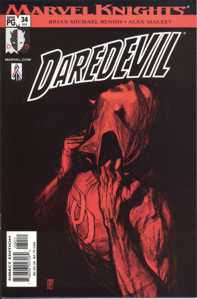 |
If there is one distinct characteristic about Daredevil, it's his poor record with his secret identity. These days it's fashionable for super heroes to lose their identities or expose themselves to the world. However, in that field, no one beats Daredevil. He's had identity slips up since his early stories.
Secret identities are increasingly becoming like super hero costumes, thought bubbles and sidekicks. They seem passé for many fans. Many prefer the integrated character that is always the same no matter where he is. It seems for many that it is more fun to forego the effort to follow a tale where a man or woman is really two characters than to gaze at the never-ending introspection behind a single figure.
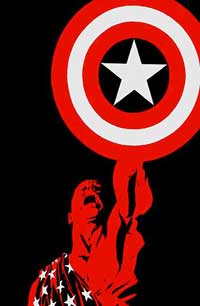 |
Green Arrow has ditched the identity years ago. He was the last one to figure out that a blond guy with a goatee wearing a domino mask is easy to remember. Most of the X-Men fight foes who already know them or can find out who they are in seconds. Thank God for telepathy and evil siblings. The Justice Society's alumni only wear their mask out of habit.
When George Perez rebooted Wonder Woman after the 1985 Crisis, he disposed of the entire Diana Prince's legacy. I wasn't reading comics regularly at the time, but I've yet to hear strong complaints about that. The Fantastic Four ditched their secret identity soon after they left the fictional Central City for New York City. When you think of it, Ben Grimm's long coat didn't hide much.
For many super heroes, the secret identity is part of their modus operandi and part of their charm. Superman would probably not feel right without his hidden Clark Kent's persona. What's fun about his last incarnation, is that people assume he's Superman full time. After all, he doesn't wear a mask. Please don't ask how that one works, although I'm sure Oliver Queen would be interested.
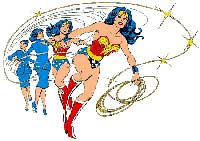 |
Daredevil is the type of character that should have a secret identity. He is a vigilante with activities on the fringes of the law. He is not a powerful character who can withstand attacks from villains and neither has he the built in protection of a team of super human. He doesn't even have a special headquarter. Daredevil is so human that any threat to Matt Murdoch is real.
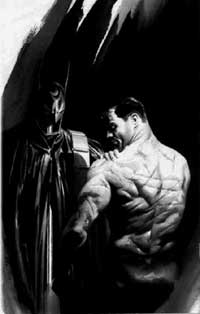 |
When I read the recent "OUT" storyline by Michael Bendis, I was at first annoyed that Daredevil's identity problems were again used as plot devices. After all, I had read Roy Thomas and Gene Colan stories where Matt Murdoch had to fake his death to prove he wasn't the red vigilante. I had read Frank Miller and David Mazzucchelli's BORN AGAIN, where Karen Page betrayed Murdoch for some drugs.
I had read D.G. Chichester and Scott McDaniel's FALL FROM GRACE where Matt had to fake Murdoch's death again to cover his Daredevil identity from reporters. So much was written on Daredevil's precarious secret identity that in a fun story from 1996 by Karl Kesel and Cary Nord, Peter Parker, Ben Ulrich and Karen Page each tried to cover up the mysterious departure of Murdoch.
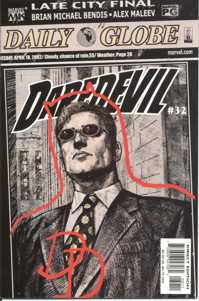 |
Of all the stories dealing with Daredevil's troubles with his secret identity, OUT was the one that explored the implications the best. This time, it seems that there will be no super brainwashing device or convenient appearances by a Matt Murdoch clone side by side with Daredevil to dispel any allegation that the vigilante and the former are the same man.
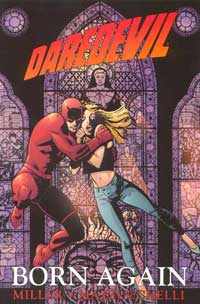 |
A vigilante without a secret identity is exposed to retaliation from the authorities. He is also more likely to suffer from surveillance from good and bad people. A vigilante can operate freely. Green Arrow and Black Canary do. However one could argue that their Justice League and Justice Society membership give them some immunity.
Foggy will probably become the obvious target of anyone with a beef with Daredevil. If I were Foggy, I would be worried. So far Bendis has proven that he could seriously integrate Daredevil's outing in stories. Since this series is a prestige title available only to superior creators, we have some guarantee that they will play with the outing in their stories.
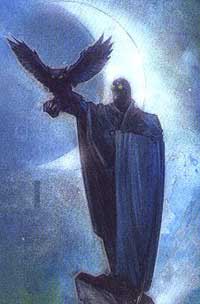 |
The current slide into realism happening to Daredevil mirrors in many ways the one that happened to Green Arrow under Mike Grell. I really see both series and characters as the flip coin of their respective publisher. Today, Green Arrow is more involved in the super hero business than under Grell, however, he has not regained his secret identity. Only time will tell, if Marvel will follows DC Comics' tradition.
Related Articles:
Daredevil Born Again Review
Review: Daredevil #595
Review: Daredevil #22
Marvel's Daredevil: The Complete First Season Coming in November on Blu-Ray
Review: Daredevil/The Punisher (2016) #3
Daredevil #7
Daredevil’s 2015 Series on Netflix – A Review
Why Daredevil Is Not on Blu-Ray?
Daredevil and The Defenders Headed to Netflix
The Original Daredevil Archives Volume 1
